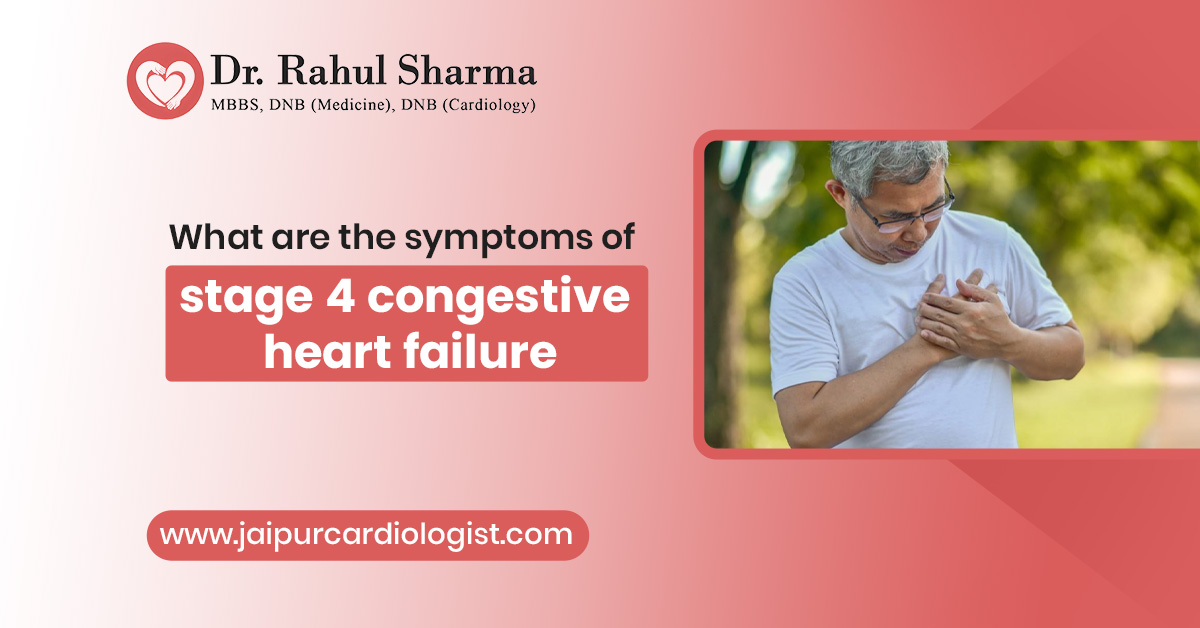
What are the symptoms of stage 4 congestive heart failure?
When heart failure progresses to the final stage, life changes in profound ways. It doesn’t happen suddenly. Instead, it creeps in, step by step, until the body begins to falter. You may know someone who has been living with heart failure, or maybe you’re facing it yourself. Either way, understanding the stage 4 congestive heart failure symptoms matters more than ever.
At this stage, the heart struggles to pump blood enough to support everyday functions. Breathing, moving, even eating can feel overwhelming.
How Heart Failure Develops Over Time
Heart failure isn’t something that appears overnight. It’s a slow process.
It starts quietly. You may not notice anything wrong at first.
Then, gradually, mild signs appear—tiredness, occasional breathlessness.
Little by little, these symptoms grow worse. By the time Stage 4 arrives, there’s no hiding from it.
What are the stages of Congestive Heart Failure?
Stage 1: No symptoms, but risk factors such as high blood pressure, diabetes, or obesity exist; lifestyle changes can prevent progression.
Stage 2: Mild symptoms with exertion.
Stage 3: Fluid starts to be retained, and symptoms are present at rest.
Stage 4: Severe symptoms, and the heart is in a critical condition.
What You Experience in Stage 4 Congestive Heart Failure
I’ve met many people at this stage. Here’s what they’ve told me:
Breathlessness All the Time
Simple acts—sitting, lying down, walking across a room—feel like climbing a mountain. Oxygen seems to slip away, no matter how deep you try to breathe.
Extreme Fatigue
The exhaustion doesn’t let up. Even eating or taking a shower feels draining. You feel like your body is betraying you.
Swelling That Won’t Go Away
Legs, feet, and sometimes the belly swell noticeably. Shoes don’t fit. Clothes feel tight. The swelling can sometimes cause discomfort and skin problems.
Confusion or Forgetfulness
Simple tasks become difficult. The mind feels foggy, memories slip, and concentration is almost impossible.
Persistent Cough
It’s quite unlike any other cough — persistent, which often releases frothy or blood-tinged sputum. The lungs are so full and heavy that you feel as though you’re drowning in fluid.
Heart That Feels Unsteady
You get lightheaded, weak, and sometimes think you might even pass out when your heart is beating irregularly or palpitating.
Losing Interest in Food and Digestive Difficulty
Food doesn’t appeal anymore. Nausea, bloating, and fullness quickly make eating almost impossible.
Early Warning Signs That Often Go Unnoticed
Before reaching this critical stage, there are small signals that are easy to miss but important to recognize. These congestive heart failure warning signs include:
- Feeling short of breath after walking a short distance
- Noticeable swelling in the legs or ankles
- Fatigue that doesn’t improve
- Frequent nighttime trips to the bathroom
What’s Next: The Final Stage Heart Failure Prognosis
The prognosis for end-stage heart failure can differ based on age, general health, and treatment alternatives. Untreated, life expectancy may be short, in the order of a few months. But while heart failure can’t be cured, the progression of the disease can be managed to keep you comfortable and live longer.
Diuretics, ACE inhibitors, and beta-blockers are among the medications that can help to control symptoms. Invasive approaches such as the use of implantable devices or even a heart transplant might be an option for patients in this late stage.
Managing Symptoms Day by Day
It can be challenging to live with symptoms of stage 4 congestive heart failure, but you can make daily changes that will improve the quality of your life. By listening to your body and following the advice of your doctor, you can better address symptoms and minimize complications while feeling good.
Medications: Follow your doctor’s orders and take all medicines as directed to decrease swelling, heart working properly, and assist the heart in pumping more effectively.
Diet: Restrict salt and carefully manage fluids to help prevent the accumulation of fluid, leading to increased swelling.
Devices: A pacemaker (or defibrillator) can help control the heartbeat and keep one’s rhythm up to speed.
Daily Check-Ins: Measure weight, swelling, breathing, and other symptoms regularly to discover changes early and react in time.
Final Thoughts
Advanced heart failure is difficult to confront, but the care you receive matters. Your Healing Hand Partner in Jaipur, A Heart Failure Treatment Doctor in Jaipur, does more than write prescriptions—they listen, interpret, and work with you to formulate a treatment plan that offers some relief.
It’s not about miracles. It’s the little stuff, small adjustments that make things more comfortable and help patients feel supported.
Every day counts.



